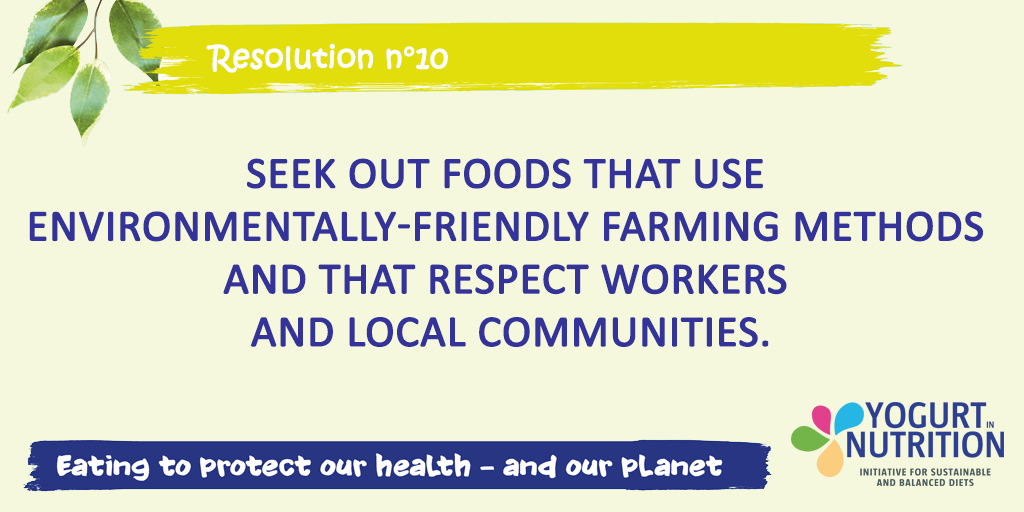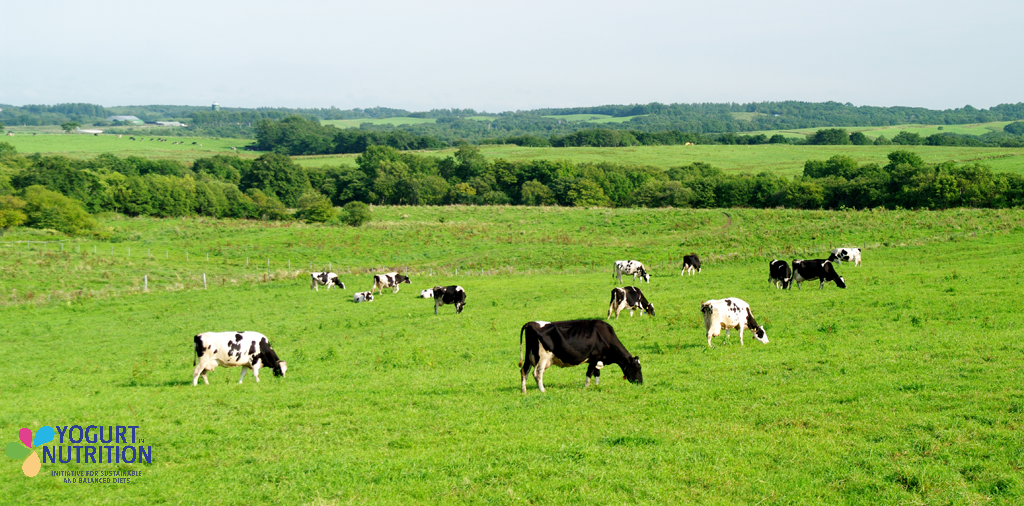At the Yogurt In Nutrition Initiative, we look forward to a more sustainable 2020. Based on all the science we’ve read and the materials we’ve published on the subject, we bring you 12 food resolutions to protect our health and our planet. Among them, what about selecting foods using environmentally-friendly farming methods and respecting workers and local communities.
Seek out foods that use environmentally-friendly farming methods and that respect workers and local communities

When it comes to environmentally-friendly farming methods
Agriculture intensification comes with an increase in the use of water, energy and chemicals (as fertilizers, pesticides, and herbicides), which leads to pollution, water depletion and biodiversity loss.
Recent studies point out that we have three main pathways to achieve a more sustainable food system which preserves natural resources and ensures a healthy diet for all. In addition to switching to a more plant-based diet and reducing our food loss and waste, we also need to change the way we produce food and manage it. More environmentally-friendly farming methods are required as well as preventional agriculture spread onto new land, in order to preserve biodiversity.
With these goals in mind, EAT-Lancet gives some recommandations regarding food production, such as:
- limit land use (stop the spread of agricultural lands for instance)
- safeguard existing biodiversity
- reduce water use/manage water responsibly
- reduce nitrogen and phosphorus pollution (from fertilizer use)
- produce zero carbon dioxide emissions
- cause no further increase in methane and nitrous oxide emissions
They also suggest to improve our global agricultural system, which need to switch from being a major greenhouse gas producer to a greenhouse gas trap by acting as a sink for carbon emissions – as our forests and wild vegetation relieve pressure on the environment by locking in carbon dioxide.
Pioneering studies have modeled tomorrow’s sustainable diets to identify efficient and eco-friendly agricultural practices that can help us respect environmental limits and provide healthy and nutritious food to our growing population.
It is our responsibility to act positively at our own level. We do have a way to make things change. By choosing a sustainable healthy diet such as flexitarian diet, we may help to preserve biodiversity (including that of crops, livestock, forest-derived foods and aquatic genetic resources) and avoid overfishing and overhunting as well as the use of antibiotics and hormones in food production. We may also contribute to maintaining greenhouse gas emissions, water and land use, nitrogen and phosphorus application and chemical pollution within set targets.
To have a diet that is as healthy for us as it is for the planet, we may:
- Try to buy more organic.
- Inform ourselves about the practice of production (local, animal welfare, …)
- Try to choose antibiotic-free meat as well as organic vegetables and fruits to preserve our planet’s plummeting biodiversity.
- Seek out local, seasonal, organic, fair trade… agricultural products.
Next time we go shopping, we may all think about where our food comes from and how it was produced. It may help us choose for more quality, for us and the environment…
For more information, check out our Q&A about sustainable diet:
- What is a sustainable diet?
- What needs to change in food production to help us achieve a sustainable diet?
You may also like our sustainable and environmentally-friendly recipes:
Sources:
-
FAO & WHO. Sustainable healthy diets guidelines principles. 2019
-
Willett W, Rockström J, Loken B, et al. EAT-Lancet Commission Summary report: Food in the anthropocene: the EAT– Lancet Commission on healthy diets from sustainable food systems. Lancet. 2019;393(10170):447-492.
-
Drewnowski A; Ecosystem Inception Team. The Chicago Consensus on sustainable food systems science. Front Nutr.2018 Apr 25;4:74.
-
Poux X, Aubert PM: IDDRI. An agroecological Europe: a desirable, credible option to address food and environmental challenges. 2018.
-
FAO & WHO. Sustainable healthy diets guiding principles.
-
Foley JA, Ramankutty N, Brauman KA, et al. Solutions for a cultivated planet. 2011;478(7369):337-42.
-
Sustainable food systems and diets : a review of multi-stakeholder initiatives. 2018.



